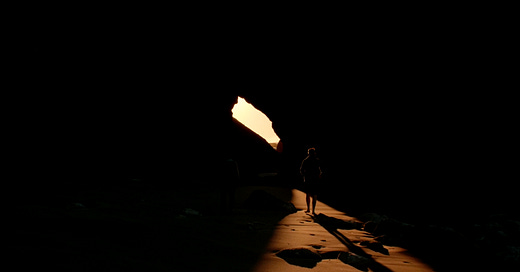
I am a heavy-duty procrastinator, which is a problem when you have a newsletter to write. And this time around, I come to admit that I’ve procrastinated too hard. At least the reason I haven’t plunged into YouTube’s “Subtitles/CC” search filter, was because of cinema elsewhere. As I mentioned while covering The Far Paradise, it’s been back-to-back with film festivals in Britain. I was fortunate enough to be accredited for the Berwick Film & Media Arts Festival, and have been trying to watch as much as I can.
Held annually in the coastal town of Berwick-upon-Tweed, located on the cusp of Scotland’s south and England’s north, BFMAF pivoted to an all-online festival this year. This could have been a challenging transition, particularly as the programmers select directors whose work straddles both cinema screen and gallery space. I’ve listened to conversations on their website where filmmakers have mentioned creating work that allows for the temporality of a gallery experience, where an audience member can walk in and walk out, attentive for as long as needed before turning to another artist’s work. That is as much a social space as the cinema is, and many of the fest’s selections feed into and play with your experiences in both arenas. This could be impacted when sat criss-cross apple-sauce on a duvet, but the quality of many of these features and shorts shone through. It’s been illuminating to feel the home screen become a home gallery and home cinema, often simultaneously. If I procrastinated, at least it was in support of a hybrid experience.
This entry will focus on three works at BFMAF that could really do with your attention - I plan to do some free-form ramblings at my just-birthed Letterboxd on works by Zinzi Minott, Ayo Akingbade, Lemohang Jeremiah Mosese and Lisa Spilliaert. If you’re looking to register for accreditation, you can do so until the end of play today, the 11th October. Access will be up for most titles until 11th November. Do it.

Badnam Basti (dir. Prem Kapoor, 1971, India)
In case you don’t follow me on Twitter, I was falling over myself to describe Prem Kapoor’s Badnam Basti, a recently rediscovered work that is usually called India’s first gay film. That is important for any number of reasons, but the film is far more than a historical curiosity. While often sketched out when it cries for solid lines and colour (perhaps to do with a long-lost twenty minutes of the original film), it has a power and pulse in its remarkable shifting of space and time.
A melodrama about a love triangle in rural Uttar Pradesh, Kapoor and editor/future mega-director Hrishikesh Mukherjee tear the romance from the seams of reality, turning it into an impressionistic display. Screens split apart, actors’ motions dissipate and seep to a crawl, an erotic courting is shown from a distance and bodies are turned to silhouettes. Sometimes you’re never sure what you’re watching: perhaps you’ll watch a neo-realist portrait of the area; maybe you’ll fall into psychedelic disrepair, like the incredible finale to Cecile Tang’s The Arch (1968), just longer and more disturbing. Sometimes the focus is love, sometimes it’s an obsession, gender rules, criminal activity, patriarchal abuses, subjugation, or the limits of redemption. Maybe it’s all of the above. A major discovery.

Never Rest/Unrest (dir. Tiffany Sia, 2020, Hong Kong)
Tiffany Sia is an artist that moves across practices and formats, with her work adding texture and historical context to Hong Kong’s pro-democracy movement. Her twenty-eight-minute film Never Rest/Unrest adds texture and context by stripping away both. Assembled from commissioned video work, Instagram Stories and ripped YouTube videos, Sia drops us into the middle of political protests and the hours around them - hours spent watching Facebook comments pop up, jumping on the local ferry, watching news bulletins about mass arrests. Importantly, this is all presented without subtitles. Unless you understand Cantonese or Mandarin, you will lack a Westernised guide, and Sia urges an interrogation of your response to what happens on-screen. She teaches instinct, compassion and an appreciation for the mundane - everything is important, even when it seems unimportant, uncinematic. Question what it all means. And as a reward, Doraemon (above) may join the resistance.

maɬni – towards the ocean, towards the shore (dir. Sky Hopinka, 2020, USA)
Director/cinematographer/sound designer/editor Sky Hopinka’s feature debut (pronounced “moth-nee”) opens with one of this year’s most bravura sequences, as forests and waves and seaweed and light and life turn from light to dark, and Hopinka narrates the Chinookan origin of death myth. The rest of the film follows two of Hopinka’s friends at different stages of their life — one understanding his role in a rich Indigenous heritage, the other carrying a child that will continue the heritage.
There is no rush to connect the two narrative strands, and more often than not, Hopinka will just let his camera roll to take in traditions, sunbeams and moments of personal intimacy. It elegantly drifts from one movement into the next, more like a series of deep breaths than a narrative charge - deeply soulful filmmaking, informed as much by politics and identity as it is by its clarity of vision. There is much left to say about its everyday mysticism and duty in representation, but as a pure exercise in filmmaking, you simply become awed by its gregariousness and graciousness. I didn’t realise I was crying until it ended and moved to dab my cheeks. It’s that kind of film.
MEANWHILE, ON YOUTUBE:
Celebrate the tenth anniversary of this evil, hilarious piece of shit. You may not find this as funny as I do.
SF9 ‘Good Guy’ (dir. Digipedi, 2020)
I’ve been dipping my toes back into K-pop lately, as I need something energetic to keep me attentive and pulsed-up as the weather gets shittier. Ideally, I would be pushing you in the direction of Weki Meki’s ‘Dazzle Me’, but you can feel the video trying to hide that its eight members can’t really dance. Shame, because the song is a burst of welcome bubblegum-flavoured anarchy. Instead, opt for SF9’s ‘Good Guy’, a slick garage-pop banger with a video directed by South Korean production team Digipedi, full of excellent suits and slightly unconvincing athleticism. They may not be able to convincingly play tennis or box in £600 Chelsea boots, but motherfucker, they can dance in them.




Really enjoyed reading this article! Some great pieces of writing from you as usual :)